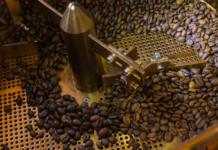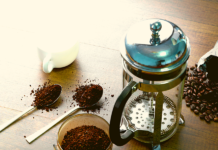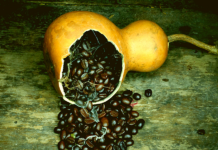Contents
Nothing can throw off a nice morning like a sour cup of joe.
Gross!
With a sour-tasting coffee, all the flavors in the cup just get distorted. And that is not what anyone needs when trying to get energized for the day.
However, sour coffee is not something that you just have to live with it. Fortunately, you can fix it pretty easily. In this article, we will show you how.
But first…
Why Coffee Tastes Sour?
Coffee tastes sour comes down to two things— bad brewing or bad beans or both.
If the coffee beans are under-roasted, then they will taste sour and grassy. If they are stale and old, then they will have a really sharp lemon-like flavor.
But, if you’re one to choose the highest quality of coffee beans or don’t let any bean go old, then it can be because of your brewing. Meaning, you will need to make an adjustment or two on how you make your cup of joe.
Usually, coffee tastes sour if it under-extracted. In short, the coffee beans did not get brewed enough, thus not all the flavors are there, balancing out the acids.
We break how under-extraction tend to happen when brewing at home:
Read More:
- Best Lipton Iced Teas
- Best Decaf Coffee: All You Need to Know About Decaf Coffee
- 10 Best Low Acid Coffee Brands Review
- Ninja Hot and Cold Brewed System Review
- Best Brazilian Coffee
1) Too coarsely coffee ground
The finer coffee grounds extract quickly. Whereas the larger ones take longer to extract. This is mainly because of the surface area available, with water getting into the center of each particle. Read More: Top 10 Best Brazilian Coffee
An overly coarse coffee grind size could simply mean that each particle is not getting enough time for a balanced extraction.
2) Inconsistent Grind
If you are using a cheap grinder, then don’t expect quality extraction. Sadly, cheap grinders can’t produce evenly ground coffee. These uneven chunks of coffee grounds prevent even and balanced extraction, thus an unbalanced, acidic, bitter, or sour tasting coffee.
3) Short Brewing Time
You want to brew your coffee long enough in order to completely bring out the flavors that can calm down the acids and hit that great-tasting cup.
With a pour-over cone, perhaps you poured water too fast and drained quickly. With a French press, you might have plunged too early or too quickly.
4) Low Temperatures
It has been proven that the best water temperature of your coffee is between 195- and 205-degreesFahrenheit. Now, if it gets below the minimum, then it will not extract the good stud as quickly as it needs to which causes under-extraction.
5) Not Enough Water
Lastly, your water to coffee ratio also matters a lot. And if you do not give each ground the right amount of water that it needs to extract a perfectly balanced brew, then you will naturally end up with under-extracted or over-extracted coffee.
Sour VS. Bitter Coffee
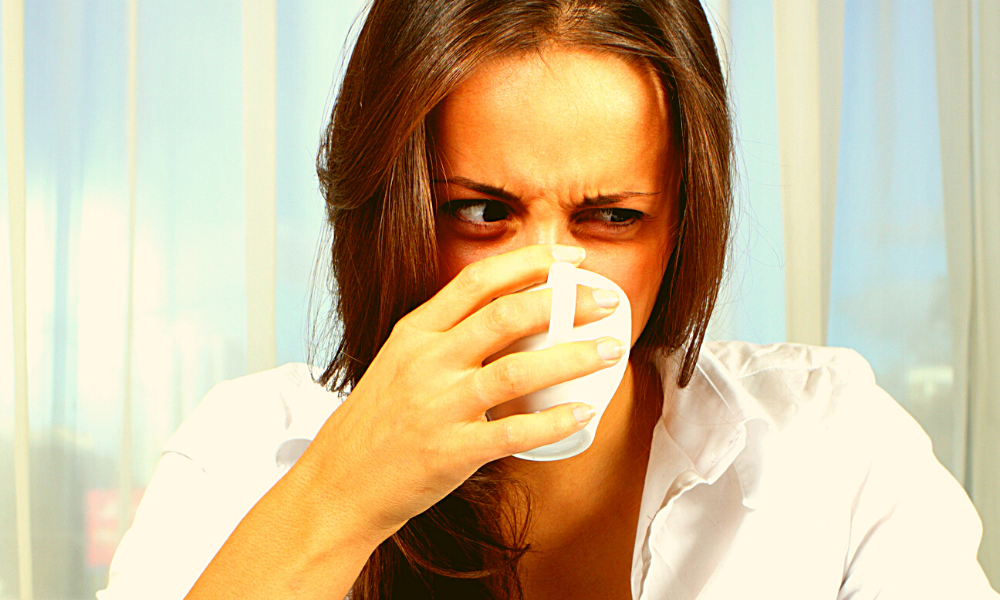

Coffee extraction happens when the flavor compounds of your ground coffee beans are extracted using hot water. Extraction is everything that the water takes from the coffee.
And different compounds are extracted at different points of the coffee brewing process, and is always in the same order:
- First off, the acids and fats are extracted. This produces an oily, sour taste.
- Secondly, sugars. This helps balance things out with its sweetness.
- Thirdly, the plant fibers will extract. And when you overdo it, the bitter elements will come out and play.
The length of the brewing process is the primary deciding factor here with the 2 unwanted options (bitter and sour) at opposite ends of the brewing spectrum.
So, if you steep your coffee too fast, there is not enough sugar extracted from the coffee beans, which results in coffee tastes sour. Similarly, if you let the coffee steep for too long, then it can over-extract and result in a bitter-tasting cup of joe.
Read More:
- Best Lipton Iced Teas
- Best Decaf Coffee: All You Need to Know About Decaf Coffee
- 10 Best Low Acid Coffee Brands Review
- Ninja Hot and Cold Brewed System Review
- Best Brazilian Coffee
4 Ways To Fix a Sour Coffee
Every bag of coffee is different. So, it is completely natural that you need to make some small adjustments along the way in case your switch beans to make it taste perfectly balanced again
One coffee may taste heavenly, but when you switch to a new coffee bean and use the same steps, it can taste sour. No worries there— that is just how fresh food works.
Remember:
Coffee tastes sour is it under-extracted.
So, the goal here is to extract more.
Here are common ways on how to increase extraction and fixing a sour-tasting coffee.
1) Grind Your Coffee Beans More Finely
The smaller your coffee grounds are, the least time it takes to extract a balanced flavor. So, even if you change nothing else, grinding your beans more finely alone can help.
Smaller coffee grounds also slow down the draining of the water in pour-over methods, extending the brewing time, thus less acidity and a sour-tasting cup of coffee.
2) Check The Water Temperature
AS mentioned before, temperature between 195- and 205-degreesFahrenheit is the sweet spot. Unless your kettle has a built-in thermometer or has a programmable heat setting, the general rule is to take the kettle off the heat at least 30 seconds before pouring it into your coffee.
Make sure to do this even when blooming coffee, since water that is too hot can over-extract even if it is just during the initial pour.
However, if you live in a high-elevation area where water boils around 195 degrees Fahrenheit, you will want to use it right off the boil so that it does not cool down.
3) Extend Brewing Time
There are a few ways to do this. If you are using an immersion brewer such as French press, then you can just add at least 20 seconds to steep the coffee beans.
If you are making a pour-over coffee, then you can just pour the hot water more slowly.
4) Use Extra Water
Remember, the water to coffee ration mostly controls how much flavor is in your coffee. And in some infusion methods, the amount of coffee for the level of water can affect the bitter/sour balance.
Adding a bit of water can help dial down the sour taste since it allows each individual coffee ground to have easier access to fresh water to
extract into. However, if you are making pour-over coffee, adding water also adds some brewing time since it takes longer to pour.
Fixing The Sour Flavor In Popular Brewing Methods


- Sour French Press Coffee
To fix a sour French press coffee, you can try brewing it longer for more extraction. You need to give your coffee at least 4 minutes of brewing time.
If that does not work, consider using finer grinds. Or you can just try out a different kind of coffee. Most French press coffee lovers like the flavor of dark roast coffees, highlighting the bitter elements to balance out the sourness.
- Sour Pour Over or Drip Coffee
If you are getting a sour drip coffee, then you might be using a grind that is too coarse. Carefully increase the fineness of your coffee grind in order to achieve a balanced flavor.
Or you can just increase the brewing time. Although this can be tricky for most pour overs with most brands like Hario and Chemex tend to shorten the brew time. This is because once the coffee drains into the carafe, there is no more water left for extraction.
So, if something like the Clever Dripper, consider increasing your brew time in a small increment of at least 15 – 30 seconds and take note of the resulting flavor. From there you can dial the right flavor.
- Sour Cold Brew Coffee
Similar to the French press, cold brew can be steeped for longer to prevent under-extraction. However, if you took a sip of sour cold brew coffee, then you might not be using a grind that is fine enough.
In addition, you also try using a higher coffee-to-water ratio. In general, you want between 1:4 and 1:5 coffee-to-water ratio for cold brew.
- Sour AeroPress Coffee
If you keep getting a sour espresso or is your AeroPress coffee tastes sour, then try again but using a finer grind size. With this, the extraction can be quick.
Or you can use your AeroPress inverted.
Seriously?
What does turning my AeroPress upside down have to do with a sour-tasting coffee? Well, some individuals developed a brewing method with the AeroPress upside down. When the brewing cycle is over, you need to put your mug on top of the brewing chamber and flipping the whole thing over.
A small amount of the under-extracted coffee tends to move back to the AeroPress brew chamber into your cup, allowing more extraction.
A Note On Sour Arabica Coffee
Another factor that can contribute to the perception of coffee tastes sour is drinking the lighter roasted and fruitier coffees, particularly the Arabica coffee beans.
If you’re used to the darker roasts and tried the light coffee such as Kenyan or Ethiopian single-origin, then the sharpness of the fruity flavor can be overwhelming. These fruity flavors can also come across as sour, when the truth is, you’re not just used to the fruitiness of the coffee.
For this, you just need to turn your coffee grinders towards the finer end of the coffee grin scale. This helps increase the extraction and providing a better-balanced cup.
Read More:
- Best Lipton Iced Teas
- Best Decaf Coffee: All You Need to Know About Decaf Coffee
- 10 Best Low Acid Coffee Brands Review
- Ninja Hot and Cold Brewed System Review
- Best Brazilian Coffee
Stale, Old Coffee Beans
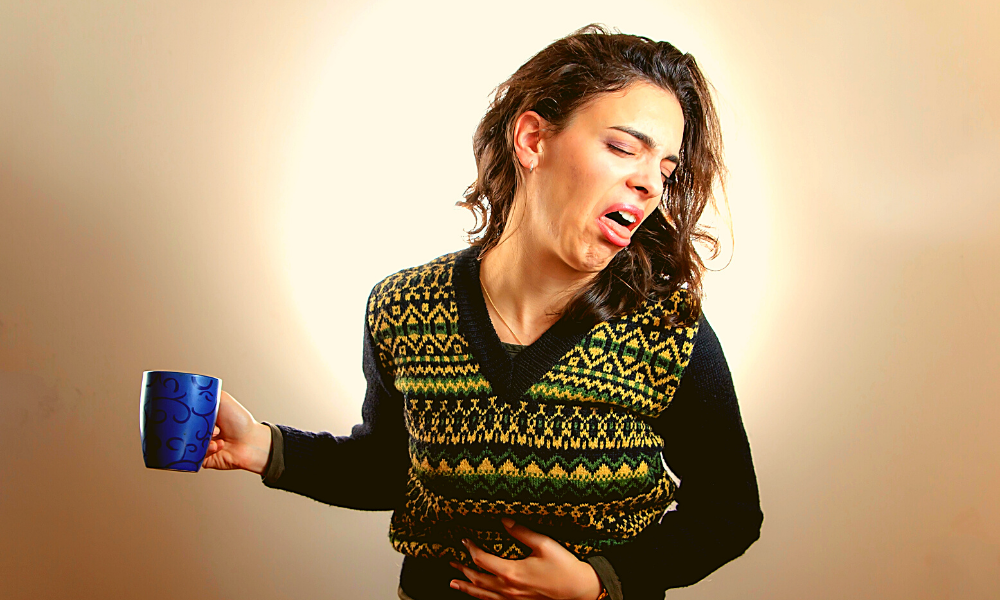

If your coffee smells sour instead of tastes sour, then it is a good sign that the oils in the coffee beans have gone bad, thus the beans themselves are now good for nothing.
Your solution for that is to just throw the coffee beans away and get a new one. But don’t repeat the same mistake. You need to get an air-tight coffee container that helps protect your coffee beans against light, heat, moisture, and oxygen.
Frequently Asked Questions
Q: Why does my coffee smell and taste sour and stale?
A: Other than the reasons mentioned above? Well, coffee can taste sour and stale if your coffee maker is not clean.
Solids and oils leftover from your previous brewing process can add stale and sour aromas and flavors to your next coffee, even if you follow all fixes above or used freshly roasted and ground coffee.
So, make sure that the coffee maker you’re using is clean. Follow the manufacturer’s instructions on how to clean it.
If you want a deep clean, then you can use a cotton swab as well as baking soda in order to clean the nooks and grooves in your filter cup which is notorious for accumulating old coffee.
Does Colombian coffee tastes sour?
A: Unless properly brewed, the Colombian coffee can indeed taste sour. They have a higher percentage of the fruity and floral acidity that can taste sour, especially if you’re used to the darker roasts or the coffee varieties from Africa or Indonesia.
In particular, the Colombian coffee from Caturra cultivar is prized for its bright and fruity aromas, usually compared to honey and tangerine. So, if your Colombian coffee is sour, you can just try grinding it a bit finer.
Q: What does a good cup of coffee suppose to taste like?
A: A nicely brewed coffee should balance sweetness, acidity, and bitterness in a single sip with a smooth flavor and having no off-notes. It should not taste overly bitter, sweet, or acidic. It needs to feel smooth on the tongue.
Final Thoughts
So, what makes coffee tastes sour?
Extraction, extraction, extraction.
If under-extracted, your coffee is guaranteed to taste sour.
Fortunately, it is an easy problem to fix. With the few tips above and a bit of tinkering, you can dial the sour notes in order to get that perfect cup of joe to energize you all day long.
If you have conquered this problem in the past or currently dealing with it, feel free to share your experience in the comment section below. Also, consider sharing this post so that we can save others from drinking a sour cup of joe first thing in the morning!
Happy caffeinating!



